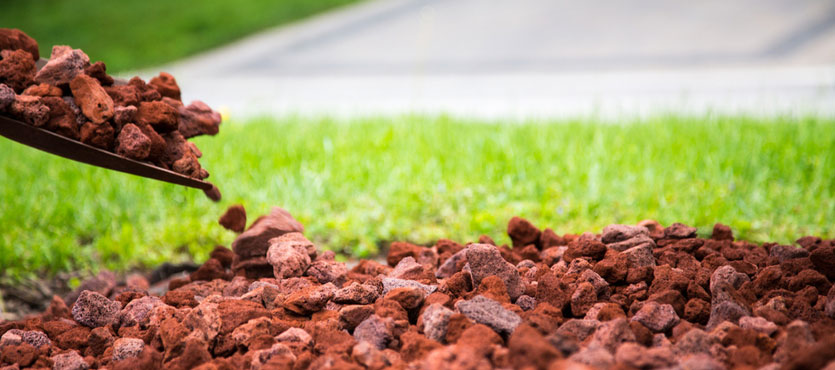Ground cover rocks are an affordable option, they are also low maintenance and highly durable for a variety of applications. Vines, shrubs, sod, bark; there many options for ground covers but almost every single one is more work to maintain than rock. Adding too much rock to your landscaping can cause drainage issues or damage soil, but using ground cover rocks in moderation makes an excellent option with several noteworthy benefits.
#1. Less Maintenance
There are a lot of beautiful ground cover options out there, but some are rather high maintenance. Nothing is easier to care for than a rock. You don’t need to trim or water rocks, and they don’t need new soil every year. Other ground covers fade in direct sunlight but rocks maintain their appearance no matter what. Mulch and wood chips start to decompose as soon as they encounter moisture. Stones never decompose so they don’t have to be replaced with the same frequency, if ever.
#2. Ground Cover Rocks Don’t Attract Bugs
Certain ground covers attract bugs, like wood chips, bark strips and plants. Stones have little to nothing to offer bugs. Therefore, pests are more likely to congregate elsewhere.
#3. Durable
Ground cover rocks offer a durable groundcover that can stand up to heavy traffic. Certain gravel can withstand the weight of automobiles and can be used to pave driveways or parking areas.
#4. You Don’t Have to Water Your Rocks
Rocks don’t need to be watered, which means they help conserve valuable resources while reducing your water bill.
Drawbacks to Ground Cover Rocks
Of course, nothing in life is 100% perfect and there are some potential drawbacks to using ground cover rocks.
- Rocks trap heat, and so if you surround the base of your home with rocks you could increase interior temperatures.
- Rocks can ruin soil over time. Rocks don’t decompose, and so they offer no nutrients to the soil, causing soil to decrease in quality over time.
- Rocks and stone tend to sink into the soil over time, which can harm soil structure and present issues with tilling or planting in the future.
- Lawnmower mishaps are more likely to occur if rocks are located near grass. If a lawnmower accidently hits rocks, one or more could fly up and cause serious damage or injury.
3 Types of Ground Cover Rocks
River rock, also known as river run gravel, is any rock that has been naturally shaped by moving water. It comes in a variety of sizes, from small to large. It works as ground cover rocks or as a dry creek bed for run-off.
Crushed gravel is defined as any stone ground cover made by crushing a larger rock into smaller chunks. Crushed rock is pushed through a sifter so that different rock sizes can be sorted accordingly. Crushed gravel makes a great filler in between stepping stones, as well as edging and basic stone ground cover.
Cobble stone is used to describe a type of rock that is made from a crushed rock—so technically it’s gravel, but cobble stones are considerably larger than traditional gravel. Coble is too big to be used as a pathway for people or animals. It’s better suited in a dry creek bed or hand placed throughout landscaping as a decorative element.
Landscaping with Ground Cover Rocks in South Florida
We have added ground cover rocks to a variety of landscaping projects in South Florida. Check out our landscaping portfolio to see some examples and get inspiration for what you want.

